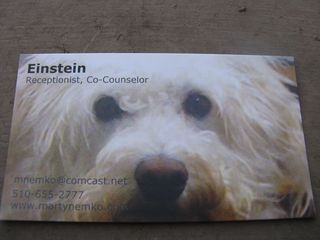Stress
A Day in the Life of a Doggie's Daddy
Details that may help you decide whether to adopt a pooch.
Posted July 22, 2016

In case you're contemplating getting a doggie (or are just up for a little mild amusement), the following report on a day in the life of this Doggie Daddy might be helpful.
Too early, I feel Einstein waking, stretching his legs and sighing, which wakes me. I feel him tiptoeing from his side of the bed to my face. I keep my eyes closed so he can feel he's waking me. He licks my face until I open my eyes. I pet him while saying, "Good morning, Einstein." He's perfectly capable of going to the backyard himself and often does during the day, but first thing in the morning for some reason, he demands company. So, his having trained me better than I've trained him, I escort him to the backyard.
I write and answer email in the morning, Einstein lying in the doggie bed that's next to my desk. When I need a break, I typically turn to Einstein for a bit of play time.
When my first client arrives, Einstein starts his workday: greeting the client with a welcome worthy of a returning soldier: a big kiss. He's an equal-opportunity greeter—he's never met a client he didn't like and if a robber came in, he'd kiss him too. If the client pushes Einstein away, Einstein isn't offended. He sits next to the client in the waiting room (my living room,) rolling over on his back in hopes of a belly rub. When I come to get the client, Einstein now becomes the escort, leading us to my office.
At that point, Einstein joins the client on the sofa. I ask the client if s/he prefers Einstein to get down. Two-thirds prefer him up. More than a few sessions have begun with a face-washing compliments of Einstein, the client giggling throughout.
During the session, if the client feels stressed or sad, s/he often pets Einstein. So Einstein is the ultimate receptionist and stress-buster. Einstein even has his own business card. (See above.) Go try to find as good a receptionist—kissing all clients, never taking a sick day, never having a bad day, and I need pay him only in kibble.
In between my late-afternoon and evening client, Einstein and I go on our daily 45-minute hike, the right amount of exercise for both of us and enough time for him to go on empty. During our drive to our favorite hiking spots, Einstein sits on my lap in the car, comforting to both of us and amusing to onlookers.
With my evening client, Einstein resumes his greeter/stress-buster role although with less ardor, tuckered out by our hike.Afterwards, I finish my Psychology Today article or answer email, with Einstein back in his desk-side doggie bed.
Before I go to bed, I take Einstein for a walk around the block after which he jumps onto my bed in the exact spot I sleep—I'm guessing he likes the smell. When I am ready to get into bed, he moves over just enough that he can sleep nuzzled against my leg.
Care for a doggie is minimal. His food and water are there 24/7 supplemented by a daily marrow bone that I have the butcher cut into Einstein-friendly pieces. The woman who cleans Einstein's teeth each year says that those bones contribute to his having healthy gums at age 10, a time when most doggies could use a periodontist.
Yes, upfront, you must be diligent about training a doggie to be perfectly housebroken, to walk without pulling on the leash, and when, off the leash, to come and stay on command. And yes, you have to endure challenges with a puppy. For example, puppy Einstein ate my medication and had to get his stomach pumped, ate my glasses, the only pair I ever thought I looked decent in. and ran out of the house and onto the freeway and I had to chase him down in my shorts and slippers. And even if you have a backyard, you should plan on walking your doggie a few times a day, for his benefit and yours—the exercise and the bonding. Despite the effort, I consider being a Doggie Daddy one of my life's best pleasures.
If you'd like to adopt a dog, I encourage you to forgo purebreds. They're expensive, more likely than mixed-breeds to have diseases from in-breeding, and too often come from puppy mills, in which the dogs are treated poorly. In contrast, if you get a dog from a rescue, pound, or humane society, you can get a mutt with its hybrid vigor, save a lot of money and a life. PetFInder.com is a nationwide directory of 290,000 dogs and cats in 12,000 pounds, rescues, and humane societies.
His new book, his 8th, is The Best of Marty Nemko.


